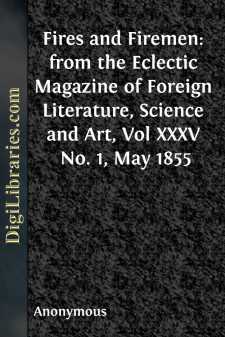Categories
- Antiques & Collectibles 13
- Architecture 36
- Art 48
- Bibles 22
- Biography & Autobiography 813
- Body, Mind & Spirit 142
- Business & Economics 28
- Children's Books 17
- Children's Fiction 14
- Computers 4
- Cooking 94
- Crafts & Hobbies 4
- Drama 346
- Education 46
- Family & Relationships 57
- Fiction 11829
- Games 19
- Gardening 17
- Health & Fitness 34
- History 1377
- House & Home 1
- Humor 147
- Juvenile Fiction 1873
- Juvenile Nonfiction 202
- Language Arts & Disciplines 88
- Law 16
- Literary Collections 686
- Literary Criticism 179
- Mathematics 13
- Medical 41
- Music 40
- Nature 179
- Non-Classifiable 1768
- Performing Arts 7
- Periodicals 1453
- Philosophy 64
- Photography 2
- Poetry 896
- Political Science 203
- Psychology 42
- Reference 154
- Religion 513
- Science 126
- Self-Help 84
- Social Science 81
- Sports & Recreation 34
- Study Aids 3
- Technology & Engineering 59
- Transportation 23
- Travel 463
- True Crime 29
Fires and Firemen: from the Eclectic Magazine of Foreign Literature, Science and Art, Vol XXXV No. 1, May 1855
by: Anonymous
Categories:
Description:
Excerpt
Among the more salient features of the Metropolis which instantly strike the attention of the stranger are the stations of the Fire Brigade. Whenever he happens to pass them, he finds the sentinel on duty, he sees the "red artillery" of the force; and the polished axle, the gleaming branch, and the shining chain, testify to the beautiful condition of the instrument, ready for active service at a moment's notice. Ensconced in the shadow of the station, the liveried watchmen look like hunters waiting for their prey—nor does the hunter move quicker to his quarry at the rustle of a leaf, than the Firemen dash for the first ruddy glow in the sky. No sooner comes the alarm than one sees with a shudder the rush of one of these engines through the crowded streets—the tearing horses covered with foam—the heavy vehicle swerving from side to side, and the black helmeted attendants swaying to and fro. The wonder is that horses or men ever get safely to their destination; the wonder is still greater that no one is ridden over in their furious drive.
Arrived at the place of action, the hunter's spirit which animates the fireman and makes him attack an element as determinedly as he would a wild beast, becomes evident to the spectator. The scene which a London fire presents can never be forgotten: the shouts of the crowd as it opens to let the engines dart through it, the foaming head of water springing out of the ground, and spreading over the road until it becomes a broad mirror reflecting the glowing blaze—the black, snake-like coils of the leather hose rising and falling like things of life, whilst a hundred arms work at the pump, their central heart—the applause that rings out clear above the roaring flame as the adventurous band throw the first hissing jet—cheer following cheer, as stream after stream shoots against the burning mass, now flying into the socket-holes of fire set in the black face of the house-front, now dashing with a loud shir-r against the window-frame and wall, and falling off in broken showers. Suddenly there is a loud shrill cry and the bank of human faces is upturned to where a shrieking wretch hangs frantically to an upper window-sill. A deafening shout goes forth, as the huge fire-escape comes full swing upon the scene: a moment's pause, and all is still, save the beat, beat, of the great water pulses, whilst every eye is strained towards the fluttering garments flapping against the wall. Will the ladder reach, and not dislodge those weary hands clutching so convulsively to the hot stone? Will the nimble figure gain the topmost rung ere nature fails? The blood in a thousand hearts runs cold, and then again break forth a thousand cheers to celebrate a daring rescue. Such scenes as this are of almost nightly occurrence in the Great Metropolis. A still more imposing yet dreadful sight is often exhibited in the conflagrations of those vast piles of buildings in the City filled with inflammable merchandise. Here the most powerful engines seem reduced to mere squirts; and the efforts of the adventurous Brigade men are confined to keeping the mischief within its own bounds.
When we recollect that London presents an area of 36 square miles, covered with 21,600 square acres of bricks and mortar, and numbers more than 380,000 houses; that all the riches it contains are nightly threatened in every direction by an ever-present enemy; that the secret match, the spontaneous fire, and the hand of the drunkard, are busily at work, it is evident that nothing but a force the most disciplined, and implements the most effective, can be competent to cope with so sudden and persevering a foe.
As late as twenty-two years ago there was no proper fire police to protect the Metropolis against what is commonly called the "all-devouring element." There was, it is true, a force of 300 parochial engines set on foot by Acts which were passed between the years 1768-74—Acts which are still in existence—but these engines are under the superintendence of the beadles and parish engineers, who are not the most active of men or nimble of risers....












